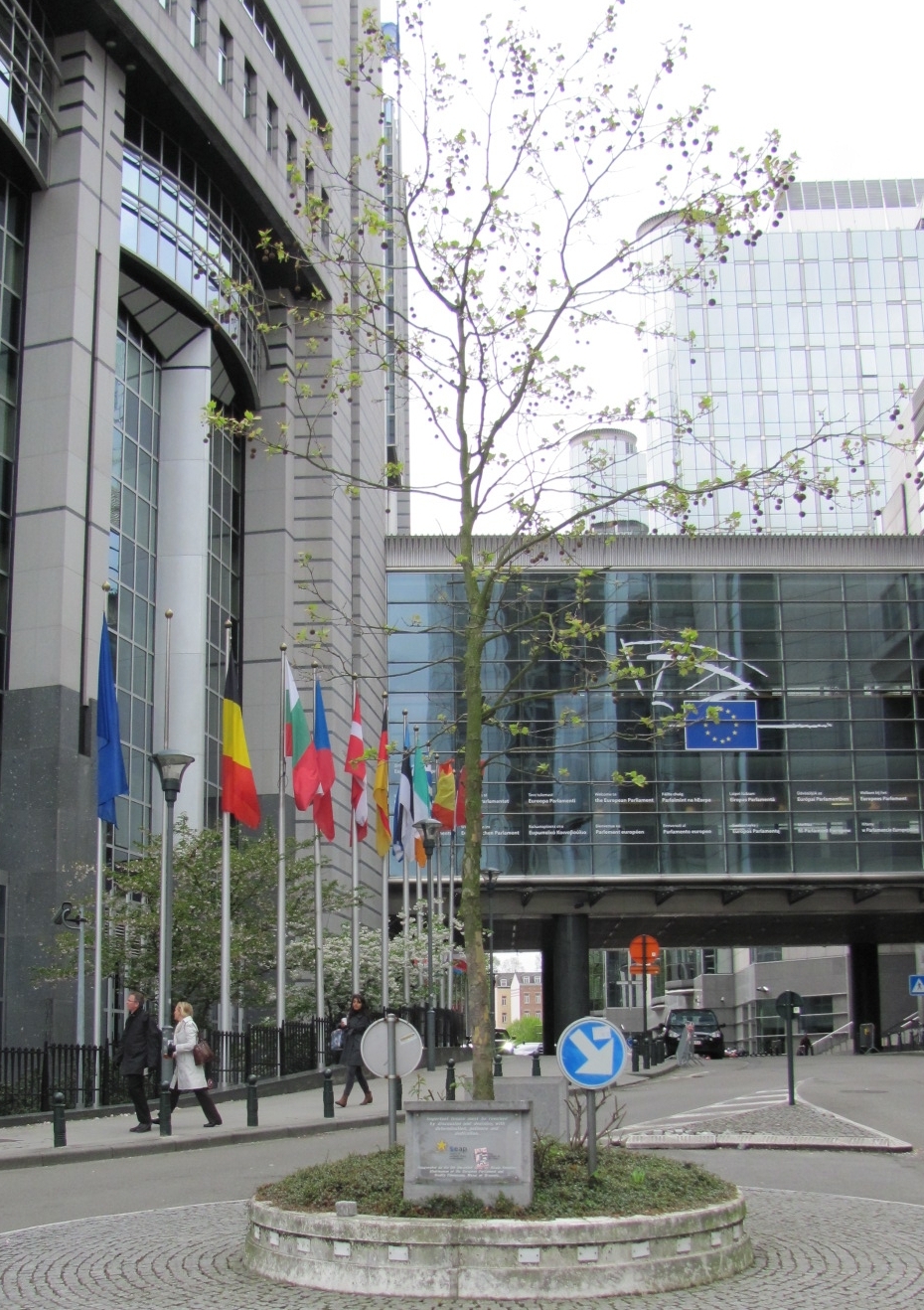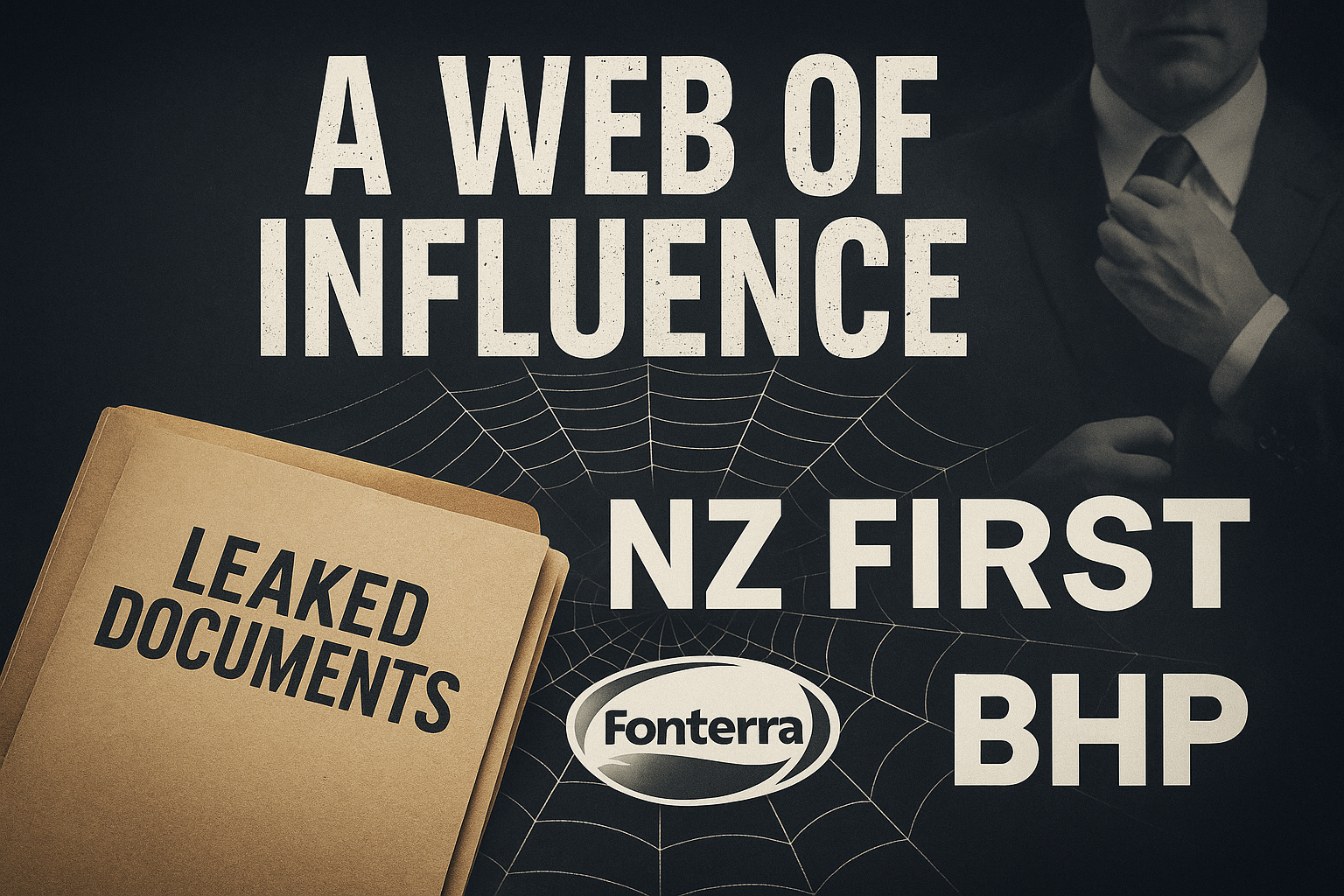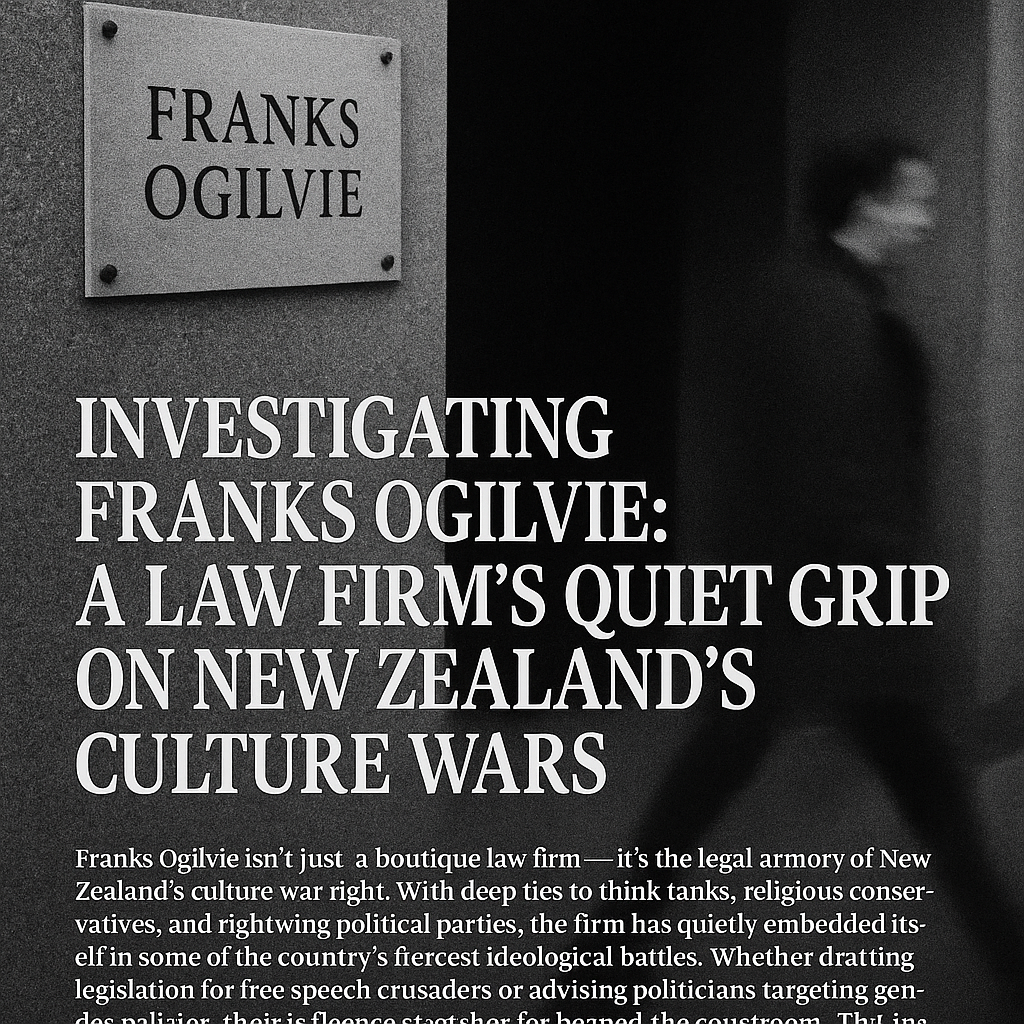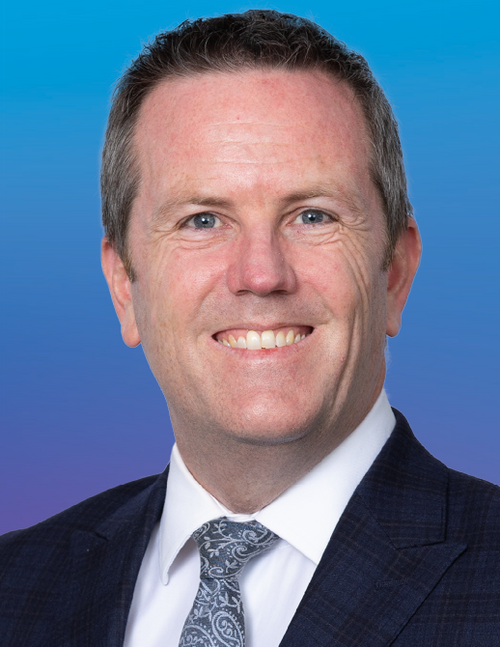Key Individuals and Entities Linked to Inflection Point NZ, The Campaign Company, and NZ First

Inflection Point NZ: Anti-Trans “Unsilenced” Summit and Network
Inflection Point NZ is a recently formed activist association opposed to “gender indoctrination and medicalisation” of children. It gained prominence by organizing the “Unsilenced: Middle New Zealand on Ideology” summit in Wellington on May 18, 2024, which featured controversial speakers and served as a strategy session against trans rights. A large counter-protest and even the city’s mayor condemned the event. Speakers included Brian Tamaki (Destiny Church leader) and Di Landy, alongside international anti-trans figures (e.g. Kellie-Jay Keen via video). Notably, Tanya Unkovich, a sitting NZ First MP, attended and was lauded by the crowd for sponsoring a bill to ban transgender people from opposite-sex public bathrooms. This indicates coordination between Inflection Point and elements of New Zealand First.
The Unsilenced summit was largely orchestrated by Rhys Williams, a businessman and former NZ First member. Williams is “the organiser of the Inflection Point conference” and a key funder. He bankrolled the event and was photographed alongside Tamaki. In April 2025, media investigations revealed Williams as the anonymous X (Twitter) user “@2ESTEKA” behind a smear campaign targeting Green MP Benjamin Doyle. This “toxic online” operation spread defamatory claims and openly encouraged votes for NZ First. NZ First’s leader Winston Peters initially amplified Williams’ claims before distancing himself when Williams was exposed. NZ First’s president confirmed Williams had been a party activist but was no longer a member. Nevertheless, Williams’ online platform was followed by “several NZ First MPs and party activists”, suggesting a sympathetic audience within NZ First. (For example, NZ First board member Helma Vermeulen and others in the party’s orbit were noted among the followers.)
In February 2025, Inflection Point NZ, through law firm Franks Ogilvie, sent form letters to health providers warning of legal liability for providing gender-affirming care to minors. This aggressive tactic – citing the UK Cass Review – was intended to intimidate providers. The move provoked backlash; Franks Ogilvie complained of a “political action campaign” targeting the firm for representing Inflection Point’s views. (Notably, principal Stephen Franks – a former ACT MP – has a history of involvement in conservative causes and free-speech litigation, including representing feminist group Speak Up For Wom) The Inflection Point letters exemplify how this network blends legal threats with political activism to halt transgender healthcare.
Connections: Inflection Point NZ serves as a hub connecting disparate right-wing and “gender-critical” actors. It brought together NZ First politicians (e.g. Unkovich, and behind the scenes Helma Vermeulen), Destiny Church fundamentalists (Tamaki), and “gender-critical” feminists (like the Landy sisters, see below). Rhys Williams’ dual role – Inflection Point organizer and online attack-dog for NZ First – underscores a “loosely coordinated, fiercely partisan network of online accounts” operating in NZ First’s orbit. This network uses events, social media, and legal campaigns in a coordinated way to advance anti-trans and other culture-war issues.
The Landy Sisters and Mana Wāhine Kōrero
Phillippa (“Phil”) Landy and Dianne (“Di”) Landy – often referred to as “the Landy sisters” – are prominent yet low-profile activists in New Zealand’s “gender-critical” movement. They co-founded Mana Wāhine Kōrero (MWK), described as “a national and international rōpū of wāhine Māori & whanaunga” opposing what they call the misappropriation of Māori culture by gender ideology. MWK is noted as “the only indigenous Gender Critical organisation in Australasia,” focused on the safety of women and children and protection of Māori tradition. Both Landy sisters spoke at the Inflection Point “Unsilenced” summit – listed together as the “Landy Sisters – Mana Wāhine Kōrero” among the event’s featured speaker. Di Landy’s speech, titled “We are who our Tupuna called for,” received a standing ovation at the summit, indicating her influence among attendees.
The Landys bridge indigenous identity with far-right feminist activism. Di Landy has explicitly positioned MWK against trans-inclusive policies, even accusing progressives of “using Māori culture to insulate their [gender] ideology”twitter.com. In October 2023, Di Landy presented to a Women’s Declaration International forum on “Children’s Rights,” sharing a platform with other anti-trans campaigners. Phillippa Landy, a 63-year-old grandmother, attracted national attention after she was trespassed from Ōtaki New World supermarket in late 2023 for wearing a gender-critical t-shirt (“Wāhine = Adult Human Female”) and allegedly harassing a trans employeep. This incident became a cause célèbre in gender-critical circles – “the Otaki supermarket banned a woman for wearing a gender-critical T-shirt” – and was cited as an example of perceived free-speech infringement. Phillippa fought back by privately writing to the store’s management, and supporters rallied to “defend free speech” and the Landy sisters. (A 2021 High Court ruling had, in fact, found that such slogans could not “rationally be described as hate speech”, emboldening activists like Landy.)
Both Landy sisters have ties to NZ First. Locally, Di Landy has been involved with NZ First’s Otaki electorate committee. In 2023, Winston Peters’ NZ First Party consulted MWK and similar activists while formulating its policies on gender and children. (Di Landy’s above-mentioned talk on children’s rights came shortly before the 2023 general election, in which Peters campaigned on protecting “women’s spaces” and rolling back self-ID laws.) According to one report, MWK acted “as consultants for New Zealand First” on these issues. This culminated in NZ First adopting positions aligned with the Landys’ agenda – for example, a pledge to repeal gender self-identification in official documents and restrict trans access to single-sex spaces. In effect, the Landy sisters’ activism directly fed into a major political party’s platform. Indeed, Di Landy’s influence was apparent when NZ First’s Tanya Unkovich championed a bathroom segregation bill and then attended Inflection Point’s summit to stand “shoulder to shoulder” with gender-critical activists.
Online, the Landys (who are not very public on mainstream media) use alternative platforms. They are associated with a Bluesky social feed called WRATH – “Women Rejecting Alt-right Transgendered Hate”. Despite its name sounding like an anti-fascist project, WRATH appears to be an ironic moniker for their circle of gender-critical feminists pushing back against “transgender ideology,” which they often link to far-right politics. The sisters (or an ally) also use the handle “Rex Landy”, a pseudonym that pops up in their advocacy. For instance, a Substack article notes “Rex Landy” delivering uncompromising testimony against hate-speech law changes. It seems one of the Landy sisters adopts “Rex” as an online persona or nickname – a detail that has caused confusion in OSINT searches (e.g. “Rex Landry” vs. Landy)bsky.app. Rex Landy appears frequently alongside the sisters in gender-critical campaigns (the trio in Image 1 are the Landy sisters, with one possibly known as Rex). Overall, the Landys leverage a mix of indigenous rights rhetoric, grassroots organizing, and close alliance with NZ First to amplify an anti-trans message under the banner of protecting “women and Māori culture.”
Helma Vermeulen: NZ First Board Member and Activist
Helma Vermeulen is a lesser-known but influential figure straddling the NZ First Party and conservative activist networks. A Dutch-born New Zealander, Helma serves on NZ First’s governing body – the party’s Board/Members’ Council – and has been involved with the party’s committees for the past six years. In the 2023 general election cycle, she was listed as a NZ First candidate (for Rangitīkei) and is considered a party stalwart. Despite her official role being behind the scenes, Helma is deeply engaged in the culture-war issues that NZ First has latched onto (law & order, anti-“woke” sentiment, etc.). On her social media (under her real name), she often promotes NZ First’s stances and criticizes progressive policies. For example, in April 2025, she publicly decried transgender identity as “pretend play” that society must not be forced to indulge. Such posts align with NZ First’s harsh anti-trans rhetoric and show Helma’s personal investment in the cause.
Notably, Helma Vermeulen was connected to Rhys Williams’ smear campaign operation on X. Williams’ anonymous account (@2ESTEKA) had a modest following that included “several NZ First MPs and party activists” – Helma among them. Her presence as a follower of that account (which spewed defamatory and extreme content against a Green MP and others) suggests she was at least aware of, if not tacitly supportive of, the dirty-politics style attack boosting her party. A journalist’s investigation specifically flagged that @2ESTEKA was followed by senior NZ First figures such as president Julian Paul, MP Shane Jones, and board member Helma Vermeulen. This put Helma in controversial company, following a feed that called female politicians “filthy” and cheered for NZ First’s return to power. When pressed, NZ First’s leadership disowned Williams as just a rogue ex-member, saying the party “cannot be held accountable” for what supporters do onlin. Still, Helma’s engagement shows how party insiders were enmeshed in an “arms-length” negative campaigning network.
Aside from social media, Helma promotes NZ First through more traditional means. She has been involved in community meetings and member recruitment drives. On X (Twitter), she openly invites like-minded critics of “wokeness” to “join NZ First” as the vehicle for change. In one May 2025 exchange, Helma welcomed a gender-critical commentator to the party, underscoring NZ First’s appeal to those disaffected by other parties’ social liberalism. Internally, Helma’s influence is significant: as a NZ First board member, she helps shape party strategy and was likely involved in the push to campaign on anti-trans and anti-“co-governance” themes. She shares ideological ground with Winston Peters’ close circle. (For instance, Helma has amplified content from Family First NZ, a conservative lobby, and echoed free-speech talking points.) Her public profile is low – she rarely features in media by name – but she exemplifies the activist-cum-party operative connecting street-level movements with electoral politics. Helma’s role illustrates how NZ First’s resurgence in 2023–24 was fueled not just by Winston Peters’ charisma, but by grassroots organizers who embedded culture-war narratives into the party’s platform.
The Campaign Company (TCC): Shadowy Digital Campaigners
The Campaign Company Limited (TCC) is a digital campaign consultancy at the heart of New Zealand’s new “astroturf” ecosystem. Founded in late 2021 by Jordan Williams – better known as the director of the right-wing Taxpayers’ Union – TCC offers “digital campaign services to political and commercial clients across the globe”astroturfing.nz. Jordan Williams, a trained lawyer, leveraged his decade of connections as an Atlas Network associate and free-market lobbyist to create TCC as a one-stop shop for online political advocacyastroturfing.nzastroturfing.nz. The company specializes in sophisticated social media campaigns, petition sites, and proxy “grassroots” initiatives that often mask the true sponsor. In Williams’ own words, he picked up these astroturfing tactics from the UK Taxpayers’ Alliance and similar groups. TCC’s track record confirms a pattern of running covert or semi-covert campaigns on behalf of right-wing causes:
Hobson’s Pledge – “We Belong Aotearoa”: In 2023, TCC built a polished website and Facebook page called We Belong Aotearoa to oppose Māori co-governance. The site, with its te reo Māori slogans and multicultural stock imagery, pretended to be a pro-unity, immigrant-led movement. In reality it was an initiative of Don Brash’s Hobson’s Pledge group, which campaigns against Māori political rights. The domain had been “registered by The Campaign Company”, and no disclosure of Hobson’s Pledge involvement was made until RNZ journalists exposed it. Observers like Dylan Reeve identified We Belong as classic astroturfing – a faux-grassroots front for a lobbying group.
“Save Our Stores” Tobacco Campaign: TCC created a site ostensibly representing small dairy owners resisting new Smokefree 2025 laws. Branded as Save Our Stores, it mimicked a mom-and-pop retailers’ movement. Investigations found it was funded by British American Tobacco and Imperial Brands (big tobacco companies) – a fact not initially transparent. Even the actual Dairy Owners’ Association disavowed the campaign. This again was a case of TCC deploying deceptive advocacy on behalf of corporate clients.
Political Candidates and Attack Ads: TCC has been hired in electoral races, usually backing right-leaning candidates. In the 2022 Auckland mayoral race, for example, TCC ran the digital marketing for candidate Viv Beck (billing her >$32k). Simultaneously, Jordan Williams’ Ratepayers’ Alliance was criticizing Beck’s rival – an apparent conflict of interest that he denied. More recently, in April 2025 TCC was revealed to be behind a series of anonymous billboard ads attacking Green MPs Chlöe Swarbrick and Tamatha Paul, on behalf of the Sensible Sentencing Trust (a conservative “law and order” group). The ads were so vicious that the Advertising Standards Authority opened an investigatione
Ownership & Personnel: Jordan Williams is the sole director of The Campaign Company. However, TCC’s staff includes other notable right-wing activists. Ani O’Brien serves as General Manager. O’Brien is a prominent free-speech advocate and former spokesperson for the gender-critical group Speak Up For Women – indicating that TCC’s leadership is ideologically aligned with the anti-“woke” causes it promotes. Another key staffer is Isuru Mendis (also known as Isuru Upeksha), a web developer for TCC. Interestingly, Isuru Mendis’s name appears as the author of several 2023 NZ First website posts, including a speech titled “2023 New Zealand’s Inflection Point” (Winston Peters’ address framing the election as a tipping point). This suggests that The Campaign Company was providing digital campaign support to NZ First, at least in managing their website or online content. It is likely that Williams – whose mentor is Stephen Franks– saw common cause with Peters’ nationalist, anti-elite messaging. (NZ First’s hardline “anti-co-governance” stance, for example, dovetailed with Hobson’s Pledge’s agenda which TCC was already advancing.) Though NZ First did not publicly declare using TCC, the overlap of personnel and themes is notable. Helma Vermeulen herself interacts online with TCC-linked figures (for instance, engaging with Taxpayers’ Union and Free Speech Union content that Jordan Williams and Ani O’Brien promote). All this places TCC at the nexus of NZ’s right-wing campaigning network – an “invisible” PR machine for hire that has assisted campaigns from NZ First to single-issue lobbies.
In summary, The Campaign Company’s operations exemplify “Dirty Politics 2.0” in New Zealand: a professionalized, tech-savvy amplification of culture wars and attack campaigns, run by politically connected insiders operating in the shadows. Its involvement with groups like Inflection Point and NZ First is usually indirect but impactful – setting up websites, managing email lists, and creating social media buzz that appears organic but is in fact carefully orchestrated. This amplifies the reach of Fringe groups and lesser-known actors (like the Landys or Rhys Williams) far beyond what they could achieve alone.
Other Associated Entities and Observations
Franks Ogilvie Law (Stephen Franks & Co.): As mentioned, this Wellington law firm has become the go-to legal muscle for the network. FO not only fired off Inflection Point’s threatening letters to doctors, but earlier defended feminist activists in court to secure venue access for anti-trans speeches. Principal Stephen Franks, a former politician, also publicly mentors figures like Jordan Williams. FO’s role shows the legal dimension of the coordinated campaign – using courts or the threat thereof to give a veneer of legitimacy to anti-trans and other “free speech” causes.
Social Media Platforms & Handles: Beyond mainstream X/Twitter (where activists like Helma Vermeulen and Rhys Williams operate), much coordination occurs in closed Facebook groups and emergent platforms. For instance, Politically Incorrect NZ and similar private Facebook groups have shared doxxing info and propaganda, acting as incubators for smear campaigns (one Facebook post even outed Rhys Williams as the Inflection Point venue booker and smear account operator). The Landys and allies appear active on Substack (e.g. Mana Wahine Korero’s newsletter) and Bluesky (WRATH). These lower-profile channels allow them to organize relatively away from public scrutiny, yet the content often spills into the public sphere via screenshots or leaks.
Domain Registrations and Websites: The OSINT trail also includes domain records and site metadata. While .nz WHOIS records are privacy-protected, the timing is suggestive: Inflection Point’s domain was created in April 2024, just in time to advertise the May event. The WeBelongAotearoa.nz domain was originally registered years earlier but repurposed by TCC in mid-2023 for the Hobson’s Pledge campaign. Such patterns – domains held or scooped up by TCC and its associates – hint at premeditation in launching front campaigns. Another example: The domain motherofallprotests.nz was registered by TCC ahead of a Groundswell farmers’ protest, linking Taxpayers’ Union to that supposedly grassroots action. Investigators should watch for innocuous-sounding domains, as they often trace back to this network.
Stacey M.: It’s possible this refers to a minor player or social media persona in the network. One clue is a Stacey who frequently comments on NZ right-wing forums – e.g., a Stacey Marriott/Marriot or Stacey Mc** (last name abbreviated) known in Facebook discussions around Bethlehem College’s anti-LGBT stance. Given the lack of clear OSINT hits, “Stacey M.” might be an alias or a pseudonymous account involved peripherally in Inflection Point or NZ First circles. The sparse information could indicate a low-profile operative (perhaps managing a WordPress blog or Telegram channel for these groups). In OSINT, the absence of data on “Stacey M.” itself is notable – it suggests this person conscientiously avoids a public footprint, which might mean they operate under a username or only within closed networks. Without further detail, we can only mark Stacey M. as a person of interest whose exact role remains unclear.
Connections & Coordinated Activities
The above profiles illustrate an interwoven network of ostensibly “lesser-known” actors – activists, lawyers, digital strategists – who collectively punch above their weight in NZ’s political discourse. Their interactions reveal a feedback loop between fringe campaigns and major political forces:
NZ First as a Political Platform: Nearly all these individuals and entities ultimately channel their efforts into bolstering NZ First’s agenda. The Landy sisters inform NZ First policy; Helma Vermeulen and Rhys Williams drum up online support (and outrage) for NZ First candidates; and The Campaign Company’s expertise (via Isuru Mendis and possibly direct contracts) helps NZ First disseminate its message professionally online. This symbiosis was on full display in the 2023 election and its aftermath, as NZ First rode the coattails of culture-war issues into a governing coalition..
Astroturf and Amplification: A hallmark of this network is creating multiple fronts to amplify a cause. For instance, the anti-trans campaign has many faces: Inflection Point NZ (public summit), Mana Wāhine Kōrero (indigenous lens), the Free Speech Union and law firms (legal lens), and anonymous social media attack accounts (guerilla lens). In reality, many of these trace back to the same pool of people sharing information and coordinating tactics. A clear example is how the UK’s Cass Report findings were simultaneously cited by Inflection Point’s letters to doctors, by Winston Peters in campaign speeches, and by the Landy sisters in public forums – indicating a shared source and strategy.
International Links: Though our focus is NZ, it’s worth noting that Inflection Point NZ plugged into global networks. The summit featured foreign speakers like Kellie-Jay Keen (UK) and showcased research “leaked” by overseas detransition activists. Meanwhile, Jordan Williams’ TCC draws on the Atlas Network playbook for libertarian causes and even partnered with foreign tobacco interests. This suggests New Zealand’s far-right advocates are neither isolated nor original – they import ideas and support from abroad, adapting them to the local context (e.g. re-framing US/UK culture wars in Kiwi terms of “Middle New Zealand” values).




Comments